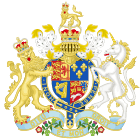Aliens Act 1793 facts for kids
| Act of Parliament | |

|
|
| Long title | An Act for establishing Regulations respecting Aliens arriving in this Kingdom, or resident therein in certain Cases. |
|---|---|
| Citation | 33 Geo. 3. c. 4 |
| Introduced by | Lord Grenville (Lords) |
Quick facts for kids Dates |
|
| Royal assent | 8 January 1793 |
| Commencement | 10 January 1793 |
| Repealed | 21 August 1871 |
| Other legislation | |
| Repealed by | Statute Law Revision Act 1871 |
|
Status: Repealed
|
|
| Text of statute as originally enacted | |
The Aliens Act 1793 was a law passed by the Parliament of Great Britain. It was created to control who could enter and live in the country. This law was very important because many people were fleeing France during the French Revolution.
The law was first suggested by Lord Grenville in December 1792. It was considered very urgent by the government. Even though some politicians disagreed, the Act became law on January 8, 1793.
Contents
Why the Act Was Needed
People Fleeing the French Revolution
The French Revolution (1789-1815) was a time of big changes and violence in France. Many people, including nobles and ordinary citizens, left France to escape the danger. This movement of people is called the French Emigration.
These refugees went to nearby countries like Germany, Austria, and Prussia. Many also came to Great Britain. Britain was appealing because it had the English Channel as a natural barrier. It was also known for being a tolerant place.
By late 1792, thousands of French refugees were arriving in Britain. In September alone, almost 4,000 people landed. Many settled in London, especially in an area called Soho. Soho was already a French cultural center. It had been home to many French exiles, like the Huguenots. Huguenots were French Protestants who fled persecution in the 1600s.
British Worries About French Arrivals
The large number of foreigners arriving made the British government nervous. They worried that spies or dangerous agents might be hiding among the refugees. These agents were sometimes called Jacobins, who supported the extreme ideas of the French Revolution.
An official from the Foreign Office wrote that many new arrivals seemed "suspicious." He thought they might cause trouble or be used by others to create confusion. Newspapers at the time also showed that the public was worried. They demanded that the government put strict controls on French people in England.
What the 1793 Act Did
The Aliens Act of 1793 made strict rules for foreigners. It said that all foreigners arriving in Great Britain had to be recorded. They also had to register with a local official called a justice of the peace.
Specifically, anyone who came to Britain after January 1793 had to give their name, job, and address. Even people who offered a room or house to a foreigner had to report these details.
The Act also allowed the government to hold people without a trial or bail. This meant they could be deported (sent out of the country) or punished easily. Some critics said this was like stopping the right to habeas corpus. Habeas corpus is a legal right that protects people from being held without a good reason. The Act's supporter in Parliament even called it a "bill for suspending the Habeas Corpus Act" for foreigners.
During the war with France, this law gave the government a lot of power. It meant that all foreigners in Britain were under the government's control. Immigrants feared being deported because of their political beliefs, security concerns, or simply because the government didn't want them there.
Impact of the Act
The Aliens Act was meant to be a temporary measure, renewed each year. However, it stayed in force for over 30 years.
While not many people were officially expelled under the Act, it greatly reduced immigration to Great Britain. The law was created because of fears about French revolutionaries. But it affected all foreigners coming to the country. For example, it led to a sharp decrease in Jewish immigration to Great Britain.
One famous person affected by the 1793 Act was Charles Maurice de Talleyrand-Périgord. He was a French diplomat who had to leave England and go to the USA because of this law.
See also
 | Janet Taylor Pickett |
 | Synthia Saint James |
 | Howardena Pindell |
 | Faith Ringgold |

